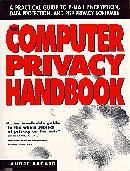In part one of this book, Guarding our Privacy in the Information Age, Bacard lays out why we should all be concerned about privacy, and why new technology changes the issues, because it allows a difference in kind: routine wholesale surveillance is now practical. He is vigorous about defending the need for, and the right for, privacy.
But even though I sympathise with his point of view, I feel that sometimes he lets his fervour carry him away, damaging his case. For example, when he argues against national ID cards (a position with which I wholeheartedly agree, by the way) he says "roughly 80 nations" already have ID cards, but names only Iraq and North Korea. This does make me wonder if he is using the rhetorical trick of choosing only what he believes to be the most emotive countries in the list, and so I am left wondering which countries comprise the remaining 78. Similarly, he says that some countries do not have national ID cards "such as Australia, Canada, New Zealand, Sweden, and the United Kingdom". Again, I am left wondering which other countries also have no ID card. [Also, although we in the UK do not have an ID card, yet, I suspect Bacard would be appalled by the way we are beginning to permit, nay, demand, CCTV cameras in many of our public areas. Bring on the famous Benjamin Franklin quote on liberty and safety.] And this fervour is a pity, because I feel the privacy case stands on its own merits.
The whole case for privacy is made much more calmly, and much more tellingly, by this short excerpt from Phillip Zimmermann's testimony to the US House of Representatives' Subcommittee for Economic Policy, Trade, and the Environment, in 1993 (the whole testimony is quoted in Bacard's book):
Quite.
In part two, Cryptology, Bacard describes the technology that we might use to guard our privacy. This is a good overview for the newcomer. Even for the already-informed, the whole section is worth reading just for one counter-argument to the "what, you got something to hide?" privacy opponents:
Parts three and four are about PGP, Phillip Zimmermann's Pretty Good Privacy crypto software. Part three explains a little of the background and controversy; part four is a User Manual. Bacard's aim is to get people to use PGP routinely, without waiting for the 'need' to do so.
The main problem with the book is that it has dated rather badly in the short time since its publication (for example, the PGP story has since moved on). And it all from a US perspective. Also -- an indication of how fast times change -- there is only a single URL in the entire Pro-Privacy Cyberspace Resources appendix. Because of its dated-ness, and some of the rhetoric, I cannot unreservedly recommend this book, much as I would like to.
